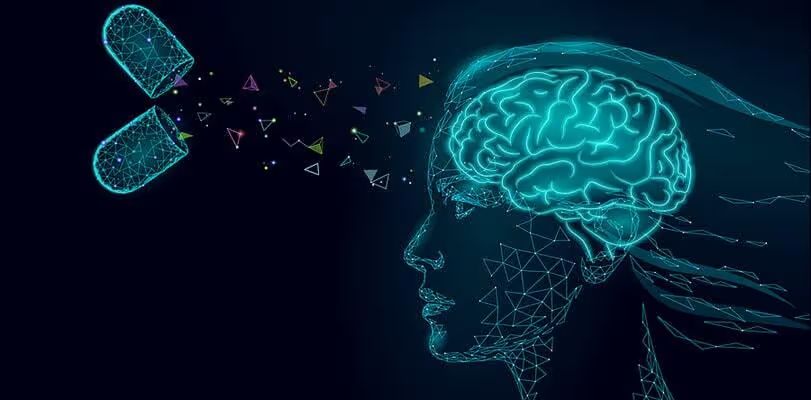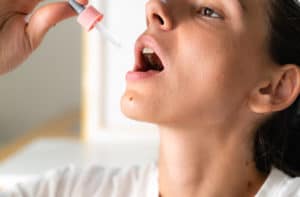Table of Contents
Polygala Tenuifolia (Yuan Zhi) is an herb used for millennia in Traditional Chinese Medicine.
Polygala Tenuifolia as a nootropic is anti-inflammatory, antidepressant, and anxiolytic.
It was traditionally used to improve memory, and for colds and mild respiratory problems.
Polygala Tenuifolia root is one of the 50 top herbs used in Traditional Chinese Medicine.
Polygala Tenuifolia as a nootropic is:
- Neuroprotective: Polygala Tenuifolia is an antioxidant and anti-inflammatory. Helping to protect from Alzheimer’s disease, Parkinson’s disease, and other age-related cognitive disorders.
- Neuroplasticity: Polygala Tenuifolia promotes the expression of the nerve growth factor called brain-derived neurotrophic factor (BDNF) in the hippocampus. Increased BDNF results it improved cognitive function and learning and memory.[i]
- Antidepressant: Polygala Tenuifolia extract acts as an MAOI which promotes the release of dopamine and norepinephrine. And it inhibits the release of cortisol to provide healthy stress levels.[ii]
Overview
Polygala Tenuifolia is an herb belonging to the Milkwort family. It’s root -known as Polygalae Radix has been used for over 2000 years in Traditional Chinese Medicine.
The active components found in Polygala Tenuifolia include saponins, ginsenosides, oligosaccharides, ketones, alkaloids, polysaccharides, and flavonoids.[iii]
In Chinese, it is called “Yuan Zhi” and has traditionally been used for optimal cognitive function and memory and to prevent Alzheimer’s and dementia. In Korean traditional medicine, it is used as an anti-psychotic because it is a serotonin and dopamine receptor antagonist[iv]
Polygala Tenuifolia is officially listed in the Chinese Pharmacopoeia Commission, 2015.
The rhizome of Polygala Tenuifolia is used in making cough medicine and for respiratory disorders because it helps clear air passages.[v]
Polygala Tenuifolia has also been used traditionally to reduce inflammation, learning and memory, dementia, anxiety, energy, and cancer.[vi]
In 2014, a study conducted at the Peking Union Medical College in Beijing found Polygala Tenuifolia extract worked as an acetylcholinesterase inhibitor (AChE) which increases acetylcholine activity in the brain.
The researchers also found Polygala Tenuifolia extract acted as a monoamine oxidase inhibitor (MAOI) which increases dopamine and norepinephrine use in the brain. Inhibiting both of these enzymes resulted in improved learning and memory.[vii]
 How does Polygala Tenuifolia work in the brain?
How does Polygala Tenuifolia work in the brain?
Polygala Tenuifolia boosts brain health and function in several ways. But two in particular stand out.
- Polygala Tenuifolia for learning and memory. Studies show Polygala Tenuifolia supports dopamine and norepinephrine signaling, upregulates acetylcholine and brain-derived neurotrophic factor (BDNF), and boosts synaptic transmission in the hippocampus for better learning and memory.[viii]
A study conducted at Seoul National University wanted to find out if Polygala Tenuifolia extract (BT-11) could enhance memory in healthy humans.
Participants received capsules of BT-11 or a placebo 3-times per day for 4 weeks. The study found those supplementing with BT-11 showed significant increases in working memory but not the placebo group.[ix]
- Polygala Tenuifolia for depression. In animal studies, the compound 3,6′-disinapoyl sucrose (DISS) found in Polygala Tenuifolia has been shown to inhibit both MAO-A and MAO-B, reduces cortisol release, and superoxide dismutase (SOD) activity (which causes oxidative stress).
The reduction of cortisol, oxidative stress, and increased dopamine and norepinephrine release has consistently been shown to act as an anti-depressant.[x]
How things go bad
Neurotransmitter dysfunction, oxidative stress, increased cortisol, and inflammation often results in:
↑ Increased depression
↓ Memory loss
↑ Insomnia
↑ Obesity
↑ Anxiety
Supplementing with Polygala Tenuifolia has been shown in multiple clinical studies as well as user reports to relieve anxiety and depression, improve memory, support healthy sleep, and avoid neurodegenerative disease.
 Polygala Tenuifolia benefits
Polygala Tenuifolia benefits
Polygala Tenuifolia is one of the most frequently mentioned herbs in the Zhong Hua Yi Dian (“Encyclopedia of Traditional Chinese Medicine“) for memory disorders and improvement.[xi]
Polygala Tenuifolia acts as an MOA inhibitor which increases dopamine and norepinephrine in your brain.
This ancient Chinese herb helps reduce cortisol, inhibits inflammation, and regulates glutamate AMPA receptors.
Polygala Tenuifolia extract has been shown to reduce the proinflammatory cytokines tumor necrosis factor-α (TNF-α), interleukin-1β (IL-1β), IL-6, and IL-8 levels in the hippocampus. Which has been shown in animal studies to have a significant effects on learning and memory.
Polygala Tenuifolia boosts the expression of brain-derived neurotrophic factor (BDNF) and Nerve Growth Factor (NGF), increase synaptic plasticity, and decrease the accumulation of amyloid β-protein implicated in Alzheimer’s Disease.
It has also been found to increase dopamine neurons and improve motor impairment in Parkinson’s Disease.[xii]
Neurohackers consistently report Polygala Tenuifolia is a potent anxiolytic and reduces anxiety quickly especially when used sublingually.
How does Polygala Tenuifolia feel?
 The written anecdotal evidence provided by Neurohackers report that when using Polygala Tenuifolia as a nootropic helps them say bye to melancholia and hello to happiness.
The written anecdotal evidence provided by Neurohackers report that when using Polygala Tenuifolia as a nootropic helps them say bye to melancholia and hello to happiness.
Others say Polygala Tenuifolia is a great supplement and report feeling calmer and more focused the first day they used Polygala Tenuifolia. For some it can take a week or two to feel the full benefit of this supplement.
Some say it provides a nice but small mood boost and the antidepressant effect is preferred over St. John’s wort.
Polygala Tenuifolia seems to be effective for Seasonal Affective Mood Disorder (SAD).
The calming benefit of Polygala Tenuifolia when dealing with chronic stress is more pronounced and happens quicker when used sublingually.
“Within less than a minute it felt like the Divine hand came down and grabbed all the negativity and replaced it with serenity and a strong not giving a f**k feeling”.
Used sublingually, some say using Polygala Tenuifolia was more effective for sleep than any other nootropic they’ve tried.
Polygala Tenuifolia is a game-changer for some because it gives them the mental space to become the observer and be more mindful. Making it easier to recognize and mitigate negative thought patterns.
Like any nootropic supplement, Polygala Tenuifolia will not work for everyone.
But if you are fortunate and it works for you, it may help you feel again, music may sound better, and you’ll feel human again.
Polygala Tenuifolia Clinical Research
Most of the clinical studies with Polygala Tenuifolia are animal studies rather than human studies. The very few with humans have been conducted primarily with the elderly for improving working memory and cognition. And for improving sleep.
Polygala Tenuifolia for sleep
 The active component found in Polygala Tenuifolia that provides it sedative effective is Senegenin.[xiii]
The active component found in Polygala Tenuifolia that provides it sedative effective is Senegenin.[xiii]
A study conducted in China using mice found the Tenuifolin found in Polygala Tenuifolia increased non-rapid eye movement (NREM) and rapid eye movement (REM). Mimicking natural sleep patterns.
The researchers found the sleep-enhancing effects of this herbal extract were due to decreased norepinephrine, and increased GABA and acetylcholine levels in brain regions involved with sleep. [xiv]
Polygala Tenuifolia extract improves memory
Polygala Tenuifolia has been used for centuries as a sedative. And more recent research shown its effectiveness for improving memory in animal studies and in healthy humans.
So, researchers in South Korea wanted to find out if Polygala Tenuifolia extract could also benefit memory in elderly humans.
A double-blind, placebo-controlled trial using the Polygala Tenuifolia extract BT-11 was conducted with approx. 50 elderly people.
The researchers found that supplementing with Polygala Tenuifolia extract (BT-11) significantly improved short-term memory and recall in elderly people.
And the research team concluded “BT-11 could enhance some cognitive functions including memory in elderly humans. And may be used as a nutraceutical for disease prevention and/or treatment”. [xv]
Polygala Tenuifolia Recommended Dosage
 The recommended adult dosage for Polygala Tenuifolia extract is 100 – 300 mg up to 3-times per day.
The recommended adult dosage for Polygala Tenuifolia extract is 100 – 300 mg up to 3-times per day.
Supplementing with Polygala Tenuifolia at the adult dose has also been found to be safe in children and young people up to 19 years of age.[xvi]
Polygala Tenuifolia Side Effects
Polygala Tenuifolia is considered non-toxic and safe to use a nootropic supplement.
Polygala Tenuifolia may cause vomiting, diarrhea, and mild indigestion in some people.
Type of Polygala Tenuifolia to Buy
Polygala Tenuifolia extract is available in capsules, tubs of powder, and as a tincture for sublingual use.
Users consistently report they experience the benefits of Polygala Tenuifolia faster and it’s more powerful when used sublingually.
I recommend Polygala Tenuifolia sold by Nootropics Depot in capsules or powder form
Nootropic Expert® Recommendation
 Polygala Tenuifolia extract 100 – 300 mg up to 3-times per day.
Polygala Tenuifolia extract 100 – 300 mg up to 3-times per day.
I recommend using Polygala Tenuifolia extract as a nootropic supplement.
Your body does not make Polygala Tenuifolia on its own. So, to get its benefits you must take it as a supplement.
Polygala Tenuifolia is especially helpful for those dealing with anxiety and stress.
Polygala Tenuifolia is reported to work well for those suffering from insomnia.
This ancient Chinese herb helps relieve the symptoms of depression by acting as an MAOI and acetylcholine levels. And reducing the proinflammatory cytokines often found elevated in those with depression.
And Polygala Tenuifolia has been found to help with learning and memory particularly with older neurohackers.
Polygala Tenuifolia extract is water soluble so can be taken at any time with a glass of water.[xvii]
Many report you will feel the benefits of using Polygala Tenuifolia if you take it sublingually.
I recommend Polygala Tenuifolia capsules or powder offered by Nootropics Depot – Polygala Tenuifolia







Join The Discussion - 29 comments
__Unknown__
May 30, 2025
Good afternoon. Can saffron, polygala, rhodiola rosea, black seed extract, alcar, alpha gpc and NAC be taken together? Many of these supplements affect dopamine, norepinephrine and acetylcholine. Wouldn’t there be an overdose or some problems?
David Tomen
May 30, 2025
It is unlikely that your combo would cause a problem. But the wise thing to do is become familiar with what each supplement does. How each supplement works in your body and brain.
You do not need a degree in neuroscience to learn this because that is why I started and continue to write for this community. To take complicated science and make it easy for nearly anyone to understand.
When building a stack like this it is best to start with one supplement and try it for a couple of days. If there is no problem then add the next and try that combo for a couple of days. Etc.
__Unknown__
May 31, 2025
Thanks very much. Bless you
Matthew
February 5, 2025
Can Polygala Tenuifolia be taken simultaneously with Oat Straw Extract, considering that they are both MAOI inhibitors?
David Tomen
February 12, 2025
Matthew, unknown because no one that I am aware of has tested it. It shouldn’t be dangerous to test it. If things go bad the worst that can happen is you will feel uncomfortable for a few hours.
George
January 28, 2025
Is it safe to start taking Polygala if you are on SSRI and olanzapine therapy??
David Tomen
January 29, 2025
George, I am not aware of any contraindication between them. Nothing has been reported that I know of.
George
January 29, 2025
Thank you very much mr.Tomen!
Matthew
October 26, 2024
Hello, can Polygala Tenuifolia be taken simultaneously with l-tyrosine and or tryptophan?
David Tomen
October 27, 2024
Matthew, yes it can.
Matthew
December 8, 2024
Much appreciated. Thank you for all you’re doing.
Andrea
July 2, 2023
Hi David wich one I should considere to stop obsessive thoughts and increase sleep ? saffron? polygala? or Kanna?
David Tomen
July 2, 2023
Andrea, Saffron has been shown to help reduce OCD as has Lemon Balm. The latter is one of the supplements I include in my sleep stack.